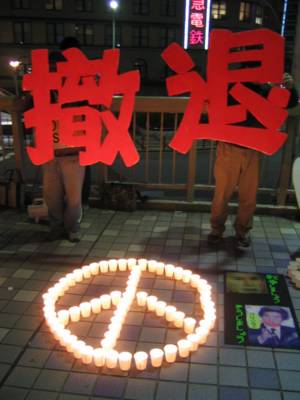Observing Michael Moore
The Observer | Review | Michael and meThis more than 20,000-word article by Anthony Andrews of the Observer announces itself in this way:
"The film-maker who could help to bring down Bush has been larging it at Cannes. He has made millions asking awkward questions of corporate America. But there are a few awkward questions we'd like to ask him..."This is an effective announcement, since it encapsulates well the article that follows, including the author's insinuations that Moore is hypocritical because he is wealthy and because he enjoyed himself at Cannes last week, as well as the (surely unintended) acknowledgment that the author could think of only awkward questions to ask Moore during his Cannes interview of the filmmaker. You might think that, with 20,000 words to spend on a figure who has attracted so much attention of late, and over such important issues, Andrews might have prepared some broad-minded inquiries to help inform himself and the public. What he asks Moore is this:
1. Do you regret your vote for Nader in 2000?For a journalist who complains about the fact that he got only 15 minutes to question Moore, it seems odd that these questions were all he could think to ask, or report on, or introduce with such bravado. What more could we have expected him to reveal, had he been granted another 15 minutes? Personally, my expectations have been all but erased. Can you imagine Andrews's managing editor, dispatching him to Cannes with this remark: "Tony, make sure you find out why Moore's friend said what he did about Moore that one day. Oh, and, definitely get right on that bit about the schoolgirl -- you know, his daughter. There could be something there, perhaps a key to that Fahrenheit flick that's been makin' such noise, who knows?"
2. Why did you send your daughter to a nice school? -and-
3. Why did your friend Ben Harper [a former Flint auto-worker whom Moore helped to become a writer] say that you don't treat people well?
I would indeed call Andrews's questions "awkward," given the trouble he went to to ask them, report on them, and dress them up as compelling investigative reporting. The answers Moore gave, incidentally, were simple enough:
1. No.One shouldn't overlook the reason for which these questions were reported on by Andrews, which was to establish that Moore "only ever established a partial relation to the truth." (If you can follow that line of thinking, please tell me how you managed...)
2. Because we didn't want to send her to an unsafe one.
-and-
3. When speaking on that occasion, Ben was drunk and admitted so to me in a letter afterwards.
Concerning the second question, Andrews writes:
"Of course, it's nobody's business but Moore's where he sends his child, except he makes it his business to detail the hereditary [sic] privilege of his subjects and tends to make his political arguments personal."Is Andrews suggesting that, to avoid hypocrisy and obtain a full relation to the truth, Moore would have to ensure that his daughter obtain no privilege whatsoever from her father's flourishing? That seems like a lot to ask of him, especially since Moore has never criticized anyone simply on the basis of their inherited privilege but only as the person's political views and actions relate to their privileged background.
Aside from the fact that this article is constructed on such fluff, it does raise a few points of substance with respect to Moore's work. Andrews has the merit of actually having seen Fahrenheit 9/11 and, in fact, has nothing but praise for it, saying, for instance, that, "such is the cumulative force of the film, with its kinetic humour and insistent sentiment, that it is hard to come away from it without concluding a) that George W Bush is not fit to be president of a golf club let alone the world's most powerful nation and b) the war in Iraq was woefully misconceived."
So, to appear critical, even to the point where he seems to be emulating Moore's own investigative rigor, Andrews resorts to i) questioning the "trustworthiness" of Moore's work generally and ii) attacking Moore's character on the basis of hearsay and spiteful personal observations. The second tactic I have already spoken of. As for the first, Andrews tries to pull this off on the strength of a single example. Here's what he writes:
"[In] Bowling for Columbine the audience is led to believe that the two teenage killers at Columbine high school may have been inured to violence by the proximity of a local weapons factory. Yet it later emerged that the factory produced nothing more lethal than rockets to launch TV satellites."This is a particularly interesting rebuttal because it speaks to the nature of Moore's films. Nonetheless, it is misleading to claim that Bowling for Columbine suggests that it is the mere proximity of the weapons factory that "inured" the students to violence. The factory had the role of a symbol of entrenched investement in military violence by the United States; this point was particularly clear when Moore discussed bombings ordered by Clinton on the day the Columbine shootings took place. Whether the factory actually produced weapons or not would matter little, as long as the children were impacted (as they certainly were) by a general culture of violence in the United States. The possibility that Moore may have been mistaken about this particular factory does nothing to diminish the force of his inquiry. There may be other suspect details and "omissions" in Moore's films, but I am not convinced that Moore's films should be considered "documentaries" and held up to the same criteria as documentaries are. Moore's investigations are much more powerful and interesting than any conventionally understood documentary.
I would agree that we cannot trust Moore's films, nor Moore, for that matter, to have a comprehensive grasp of all the facts relating to his muckraking enterprises. But that is not his role. Moore pounces on his subject matter with all his heart and raises some dust in the effort. Moore's role is to raise questions in a way that holds the public's attention and, if possible, inspires the public to action. Thus his films are "critical" films in the Marxist sense of this word. They want not only to interpret the world, but to change it.
Andrews also makes the charge that Moore's liberal nature has been compromised by his being surrounding by "paranoia." I would think that a person who has taken on such powerful targets, and who knows the viciousness of certain of his adversaries, would have reason to want personal protection.
Be that as it may, Moore's unapologetic approach to politics and art seems to inspire envy among his adversaries. The latter aspire to imitate the determined investigator in Michael Moore by attempting to turn the tables on him. What better examples of this than the resentment-brimming projects such as these?
1. http://www.moorewatch.com/This is a group-maintained blog dedicated to smearing Michael Moore on whatever basis possible. Falling short on argumentative skills, it makes frequent recourse to the single word "b---shit" to counter others' statements. It also slides into the French bashing trap that Moore correctly foresaw would be sprung after his film's celebration at Cannes.
2. http://www.michaelmoorehatesamerica.com/This is a "film project" designed to focus on the fascinating topic (!) of Michael Moore. It is fronted by a self-glossed "passionate guy with a camera" who is bent on attacking Moore as a way of defending (a fascist and simplistic idea of) the "homeland."
What the people behind these projects forget is that what makes Moore's investigations compelling is not simply their "method," but the human significance of the issues they address; to which one should add, as well, their originality and, no less, their forceful relation to truth.












